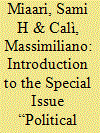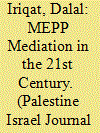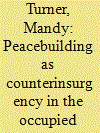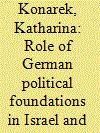|
|
|
Sort Order |
|
|
|
Items / Page
|
|
|
|
|
|
|
| Srl | Item |
| 1 |
ID:
116892


|
|
|
|
|
| Publication |
2012.
|
| Summary/Abstract |
It has become common to regard consociational democracy as a method of managing conflict in ethnically divided societies but little attention has been paid to its applicability to societies where the primary political cleavage is between secular and religious forces. This article seeks to redress this imbalance by examining the applicability of consociationalism to the case of the Palestinian Territory. We argue that, while Palestinian society is characterised by 'pillarisation' along a secularist/Islamist cleavage, formal power-sharing between the representatives of the two main Palestinian factions, namely Fatah and Hamas, has proved elusive. However, rather than seeking to explain the seeming inability of the factions to share power by reference to the nature of the cleavage, as other authors have done, we instead highlight the contextual factors that have made power sharing difficult to achieve, namely the difficulties Hamas and Fatah face in accepting each other as political partners, and opposition from external actors.
|
|
|
|
|
|
|
|
|
|
|
|
|
|
|
|
| 2 |
ID:
175500


|
|
|
|
|
| Summary/Abstract |
The Israeli-Palestinian conflict is the world’s most protracted contemporary conflict and one which has gained international prominence throughout the years. As a result of the Six Days War in 1967, the West Bank and the Gaza Strip fell under Israeli control. The conflict has evolved through ebbs and flows of violence including two Palestinian uprising against Israeli control (the First and Second Intifada). These have led to tens of thousands of Palestinian and thousands of Israeli victims.
|
|
|
|
|
|
|
|
|
|
|
|
|
|
|
|
| 3 |
ID:
170951


|
|
|
|
|
| Summary/Abstract |
During the last three decades, the world witnessed rising hopes for a peaceful resolution of the Palestinian-Israeli conflict. There were many efforts, most of which ended in failure. July 2000 witnessed the most significant attempt at the Camp David summit, where the final-status issues were placed on the negotiations table, but no deal was completed. Since then, violence and instability have escalated in the region, and today a peacefully negotiated deal is definitely far from reality.
|
|
|
|
|
|
|
|
|
|
|
|
|
|
|
|
| 4 |
ID:
139570


|
|
|
|
|
| Summary/Abstract |
It is often suggested that Western peacebuilding in the occupied Palestinian territory has failed because it has not delivered a viable Palestinian state. But if peacebuilding is reinterpreted as a form of counterinsurgency whose goal is to secure a population, then it has not failed – in fact, on the contrary, it has been quite successful. This article therefore critically evaluates the idea and practice of peacebuilding as counterinsurgency by exploring the symbiosis in the philosophy and methods of COIN and peacebuilding, and charts its implementation in the oPt through the realms of governance, development, and security. It argues that peacebuilding in this context operates as another layer of pacification techniques whose goal is to secure the Palestinian population and ensure acquiescence in the face of violent dispossession.
|
|
|
|
|
|
|
|
|
|
|
|
|
|
|
|
| 5 |
ID:
170909


|
|
|
|
|
| Summary/Abstract |
The German Political Foundations: Think-and-Do Tanks in a Globalized World
Before discussing the work of German political foundations abroad, an important remark on the terminology and the concept of ‘foundation’ must be made. The German term is ‘Stiftung.’ ‘Stiftungen’ in the sense of the creator of the word – the Greek philosopher Plato – are purely non-profit organizations administrated by a board of trustees. Nowadays, they are civil law entities that, with the aid of property and assets, pursue a purpose defined by their founder.1 German political ‘Stiftungen’ differ from such organizations in the traditional understanding of the word. Rather, these are registered associations that use the term ‘Stiftung’ as a name component. Compared to more traditional ‘Stiftungen,’ they do not own large properties and are not bound by the goals of any founder. They can organize their agenda and program flexibly, while at the same time benefiting from the positive associations of the term ‘Stiftungen.’ As classical foundations, however, German political foundations are non-profit organizations whose purpose is to promote political education and strengthen democracy and civil society.
|
|
|
|
|
|
|
|
|
|
|
|
|
|
|
|
|
|
|
|
|